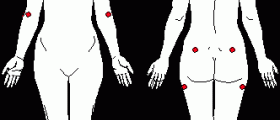
Fibromyalgia is a medical condition distinguished by chronic and widespread pain. The unpleasant feelings of pain may also be triggered by pressure to multiple points on the body. Even the slightest pressure on these points, called the tender points, may cause severe pain. Most commonly, persons with fibromyalgia are otherwise healthy individuals.
Causes and risk factors
It is estimated that fibromyalgia affects approximately 2% of United States population. The true cause of this condition is yet unknown and doctors believe that it most likely involves a number of different overlapping factors. The risk of fibromyalgia rises with the age, and the women may be at slightly higher risk.
Most commonly, this condition develops in the early or middle adulthood, but it is recorded in children and elderly, too. A significant portion of patients with fibromyalgia has disturbed sleep patterns. This condition is for yet unclear reasons associated with nighttime muscle leg cramps, restless leg syndrome, and sleep apnea. It seems like fibromyalgia runs in certain families, and the people with family history of this condition may be more vulnerable. Certain medical conditions, like rheumatoid arthritis or lupus, are also considered as possible causes of fibromyalgia. In some cases, patients may associate fibromyalgia with strong emotional trauma or stress, but in many cases there seems to be no triggering event.
Symptoms of fibromyalgia
There are a lot of symptoms associated with fibromyalgia and the chronic and widespread pain is the most prominent. However, the symptoms of this condition constantly vary in one individual. Symptoms may swing from mild to severe, usually depending on the weather conditions, stress, time of the day or physical activity.
Pain, as the major symptom, is usually constant and dull. It arouses from the muscles spreading all over the body. It seems that the radiating pain is greatly magnified by malfunctions in the way the nervous system processes pain. Patients often complain about cramps and stiffness in the joints and their movement is seriously restricted.
Fatigue is another characteristic symptom of fibromyalgia tightly associated with sleep disorders. Patients often have troubles with sleeping and they are waking up during the sleep. It is estimated that up to 80% of people with fibromyalgia experience some type of disordered sleep.
These problems with sleeping, and inability to reach deep sleep, leave patients feeling tired, drained and physically incapable of dealing with everyday tasks.
Many individuals with fibromyalgia experience cognitive dysfunction known as a “brain fog “or “fibro fog”. Patients may have lack of focus and problems with memory accompanied with inability to multi-task. These symptoms may severely obstruct personal and professional life and increase anxiety and depressive symptoms.














-vs-Trigger-Points-(Myofascial-Pain-Syndrome)_f_280x120.jpg)


Your thoughts on this
Loading...